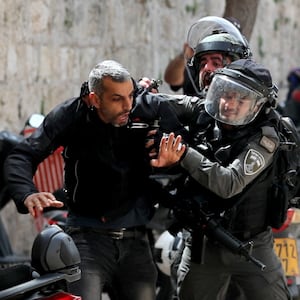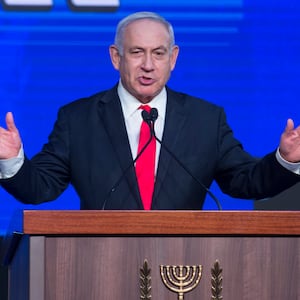JERUSALEM—Violence erupted in the Holy Land on Monday after Hamas militants fired roughly 150 rockets at Israel from the Gaza Strip, and Israel responded with major airstrikes against Hamas and other Palestinian factions in Gaza. Nearly two dozen Palestinians have reportedly been killed in connection to the attacks.
The escalation came after weeks of threats amidst ongoing clashes in the contested holy city between Israeli security forces and Palestinian worshippers.
Major clashes in the morning near the Al-Aqsa Mosque, the third holiest site in Islam, saw over 300 Palestinians injured as they battled with rocks and fireworks against Israeli police deploying stun grenades and other riot control measures. Several officers were reported lightly injured.
Clashes in and around Jerusalem’s Old City had grown worse in recent days as Palestinians neared the end of the Ramadan holiday, and Jewish ultra-nationalists planned a march through Arab neighborhoods on Monday to mark Jerusalem Day—the anniversary of Israel’s unification of what it views as its “eternal and undivided capital” in the 1967 Arab-Israeli war. Palestinians, for their part, claim the eastern half of the city as their own capital.
But after Monday morning’s clashes, the Israeli government seemed to back down, banning Jewish devotees from ascending to the Al-Aqsa Mosque compound—also the site of the Second Jewish Temple—and altering the planned parade to a less provocative route. A looming Supreme Court decision that may see several Palestinian families in the nearby neighborhood of Sheikh Jarrah evicted from their homes in favor of Jewish settlers was also postponed, primarily due to the assumption that it would add more fuel to the fire.
For most of the afternoon, the Old City was filled with masses of bored-looking Israeli riot police and Palestinian youth. A young Palestinian boy, likely no more than ten years old, sped down the main cobblestoned lane of the Muslim Quarter, chased half-heartedly by a triplet of Israeli officers laden with gear. And yet, at some point, Hamas issued an ultimatum, demanding all Israeli forces withdraw from Al-Aqsa and Sheikh Jarrah.
Two minutes after the deadline passed, the quiet Jerusalem afternoon was punctuated by rocket sirens. Lawmakers had to take shelter in the Israeli parliament building, and Jewish ultra-nationalists singing at the Western Wall grew silent. The only noise, after the sirens ebbed, were local Palestinians cheering from their rooftops, chanting “Allahu Akbar” (God is Great).
Additional rocket volleys, and an anti-tank missile, were subsequently fired from Gaza at Israel, wounding one Israeli civilian. Israel quickly responded with its own strikes, which reportedly killed one senior Hamas commander. According to Gazan health authorities, 20 Palestinians have been reported killed in connection to the attacks, including nine children.
The Israeli military warned that this could be the beginning of several days of fighting.
“This was a blatant assault by Hamas against Israel that won’t go unpunished,” Israeli military spokesman Lt. Col. Jonathan Conricus told The Daily Beast. “But I believe Hamas will get the message and learn its lesson.”
From the Palestinian perspective, Israel for weeks has violated the sanctity of Jerusalem in general and the Al-Aqsa Mosque in particular. At the start of Ramadan last month, Israeli police restricted some access to the area for Muslim worshippers, with the ensuing weeks witnessing further scuffles between Palestinian youth and Jewish ultra-nationalists on the streets of Jerusalem. Clashes then grew worse at the mosque.
Making matters worse is the uncertain state of internal Palestinian politics, which saw upcoming legislative elections canceled abruptly in late April by Palestinian President Mahmoud Abbas on the pretext of Israel not allowing a vote in East Jerusalem. “Jerusalem is a red line for us,” Abbas averred, no matter that his Fatah faction was likely heading for a dismal showing.
Not to be outdone, Hamas, an internationally recognized terror group, also subsequently upped the stakes, blaming Israel for scuttling the vote and competing with Fatah for who best could “defend” Jerusalem.
“This is our final warning: If the aggression against our people in the Sheikh Jarrah neighborhood does not stop immediately, we will not stand idly by, and the occupation will pay a heavy price,” Hamas’ shadowy military commander, Mohammed Deif, said last week in a rare public statement.
Israeli internal politics are not much more stable. Coming out of the March 23 election, the country’s fourth in two years, Israeli Prime Minister Benjamin Netanyahu failed to form a new government after an inconclusive March election, the country’s fourth in two years. As of last week, a heterogeneous grouping of opposition parties ranging across the political spectrum—from the left, center, and right—are in coalition talks over a new government. There is a real prospect that Netanyahu’s 12-year reign may soon come to an end.
“Without doubt, Netanyahu is fanning the flames in order to blow up the coalition talks,” Arab Israeli lawmaker Ayman Odeh told The Daily Beast earlier today in Sheikh Jarrah.
That may have been true initially, at the start of the recent tensions, but to Netanyahu’s credit, he appeared to step back from the brink earlier Monday and followed the advice of his security commanders to de-escalate—a move urged by much of the international community, including the Biden administration, who all expressed “concern” over the increasing unrest in Jerusalem.
But Netanyahu may have gotten his wish anyway: Opposition leaders seeking to topple him came out in support of military action against Gaza, and coalition talks are likely to be suspended until calm is restored.
Too little, too late, by all sides in this most recent—but by no means last—cycle of violence to scar the Holy Land.








